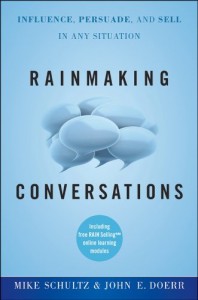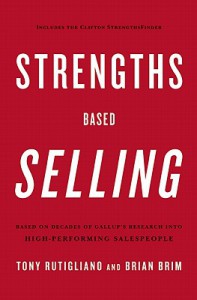 I recently had some back and forth emails with Richard Osborne. Dick has 30-plus years’ experience as a therapist. His credentials[1] include a PhD in Clinical Psychology from Harvard where he studied under, among others, Chris Argyris.
I recently had some back and forth emails with Richard Osborne. Dick has 30-plus years’ experience as a therapist. His credentials[1] include a PhD in Clinical Psychology from Harvard where he studied under, among others, Chris Argyris.
We covered a lot of ground, starting with the idea of narcissism, but ending up talking about sales and about change: personal change, corporate change, and the role played by leaders and coaches.
Following are some excerpts.
Sales readers: hang in there—the good stuff’s coming.
RO: I read your article in Trust Primer Vol. 10 about sales and narcissism with interest.
CHG: Good. I should have asked you before I wrote it—is there a guru of narcissism?
RO: You mean, as opposed to narcissistic gurus? OK, that’s just my cynicism showing. But, having seen one self-proclaimed Holy Man after another come and go (often in riches or scandal or both…), I admit that I’ve developed a certain skepticism towards the type.
CHG: Scandals aside, can’t a guru say anything important about narcissism?
RO: Sure. Some raise some interesting questions about it–specifically, the phenomenon of charisma (which I’ll define as interpersonal presence and power). Some who are charismatic are also narcissists — but not necessarily all.
The true charismatic knows what he or she is about and is naturally confident. That clear belief in oneself and one’s role (or mission or product, for that matter) is powerfully attractive because we all suffer from what William James called “the will to believe.” Most of us feel less than fully whole or confident. The charismatic therefore represents a level of confidence and a wholeness that we lesser beings admire and desire; they believe in their ability to lead and influence us and we are grateful to follow.
The narcissist, on the other hand, may project charismatic qualities but, at his core, is wounded and insecure. He seeks praise and/or followers to reassure and shore up his shaky self-regard. But he also tends to use these people and even to hold them in some contempt because, not really believing in his goodness or rightness, he believes he has manipulated and even fooled others into becoming his devotees and sycophants. He has a tendency to shore up his own self-regard up by devaluing others. He also is much more sensitive to — and sometimes explosively reactive to — criticism. The true charismatic is solid while the narcissist is brittle and reactive.
CHG: How many of each type are there?
RO: Well, there are few pure types in the real world. Many people have genuinely charismatic qualities — but are a bit narcissistic too (i.e. a little too focused on kudos and competition with peers and a bit too thin skinned). Politics is full of these types. Hitler and Khadafi are probably as close as you can get to pure narcissism. Bill Clinton and Elliot Spitzer are charismatic — but a little narcissistic too.
CHG: I bet most people would buy that.
RO: So, back to your article: certainly the fear of rejection is powerful — and potentially debilitating. I understand what you are getting at with your advice to avoid becoming a “narcissist” — i.e. to stop personalizing sales encounters as a thumbs up or down on one’s core worth and, instead, cultivate an attitude of genuine interest in learning more about what works and what doesn’t and why. That is, to become an observer and student of one’s own behavior and its effects on others and on the sales process.
In therapist-speak, you are reframing the issue so that sales encounters are not seen as a test of one’s sales “mojo” or basic worth, but to develop a process of study and mastery — or learning how to learn. (This idea harks back to Gregory Bateson, cybernetics, and “second order learning” which Argyris pushed in his books and classes. A variant of that line of thought is expressed in books like “The Talent Code: Greatness Isn’t Born. It’s Grown. Here’s How.” by Daniel Coyle and “Talent Is Overrated: What Really Separates World-Class Performers from Everybody Else” by Geoff Colvin which discuss and promote the concept of “deep practice” and the like).
CHG: Shrinks have their own issues with this, don’t they? Are shrinks any better at it than salespeople?
RO: Sure, it’s the same struggle. It’s a profession in which a majority of clients drop out quickly without explanation, leaving a lot of therapists puzzled and scratching their bruised egos. [Sales folks: sound familiar?] There’s a wide spectrum with therapists who build successful practices with waiting lists at one end, and those who struggle to maintain a quarter time or third time practice with constant cancels and no shows at the other.
So, back to my quip about narcissistic gurus. Many of the very successful therapists are undoubtedly charismatic. Some are also narcissistic, the most egregious ones being those who sexually exploit clients to stroke their own egos (and raise malpractice insurance premiums for the rest of us!).
CHG: How does a therapist evolve past this? Perhaps even more than a salesperson, a shrink has to get beyond the self-centered crap. How have you done it?
RO: I don’t think I’m very charismatic as a person or as a therapist. I know that there are clients who are disappointed with that. They are willing potential believers in search of a therapy guru. Temperamentally, I’m too skeptical and philosophically savvy to have a true belief in any one school or technique. I am an eclectic by default because any other position is intellectually and professionally untenable to me.
But I am not flying completely blind. What little science there is in my field has repeatedly yielded the following robust findings:
Schools and techniques account for a very small portion of therapy outcome. Instead, the biggest sources of variance are:
a. What the client brings to the party
b. The person of the therapist and his/her ability to form an effective therapeutic relationship.
CHG: OK, this is getting very cool. I believe the therapist-client relationship has a lot of parallels with the salesperson-customer relationship. So let’s make the translation. If the metaphor holds true, that would suggest that:
The methodology of sales you choose accounts for a very small portion of sales success. Instead, it would be driven a lot by the buyer’s predilections, and by the salesperson’s ability to form an effective buyer-seller relationship.
Does that make sense to you?
RO: I’m no salesperson, but yes.
CHG: OK then, the obvious question—and you can answer this from within the therapist metaphor—are therapists made, or can they only be born?
RO: I used to believe that the ability to form successful therapeutic relationships was simply something you had — or not; i.e. the innate talent that Coyne is referring to. For some, natural charisma is part of it.
But I have come to believe that wherever one is on the innate talent/charisma continuum, one can improve significantly through the sort of process that you are recommending to sales people — becoming a student of the interpersonal process.
CHG: We at Trusted Advisor Associates also believe that trustworthiness—which includes a lot of what we’re talking about here—can be learned. On the therapy side of the metaphor—what does it take to make it work?
RO: One key ingredient is, of course, getting feedback. Therapy research has produced another repeat finding: therapists are often poor judges of how their clients feel and react to them.
We believe we are being effective when we are actually missing the boat; and we often wrongly assume we have failed when clients drop out when some of those clients have actually gotten a great deal out of that limited therapeutic encounter.
In other words, we’re often simply clueless, groping in the dark because we’re not asking for feedback and using that to self-correct.
CHG: So: let’s review the bidding. Don’t be a methodology ideologue. Get over yourself. Learn how to relate to others—which can be done. And learn how to seek, and learn from, feedback.
Dick, what with insurers cramming reduced fees down your throat for everything you do in your profession–have you considered going into sales training? I have a sense you’d be good at it.
RO: Only if it includes trout-fishing on the Battenkill on Thursday afternoons.
[1] Dick’s also my brother in law, but don’t hold that against him.
 As announced two weeks ago, we (Andrea P. Howe and Charles H. Green) are writing a book, The Trusted Advisor Fieldbook, to be published by Wiley Books in November. True stories are a critical part of a practical book like that, and we’ve got a ton.
As announced two weeks ago, we (Andrea P. Howe and Charles H. Green) are writing a book, The Trusted Advisor Fieldbook, to be published by Wiley Books in November. True stories are a critical part of a practical book like that, and we’ve got a ton.
 Chip Grizzard
Chip Grizzard Get the Trust Reader volume 9 here
Get the Trust Reader volume 9 here Q. What do
Q. What do  Last week
Last week  When my coaching client Craig returned from the dentist following his unexpected root canal, he didn’t complain about the pain. It was the sign in the reception area that got him: “Payment Expected at the Time Services are Provided.”
When my coaching client Craig returned from the dentist following his unexpected root canal, he didn’t complain about the pain. It was the sign in the reception area that got him: “Payment Expected at the Time Services are Provided.”

 I recently had some back and forth emails with Richard Osborne. Dick has 30-plus years’ experience as a therapist. His credentials
I recently had some back and forth emails with Richard Osborne. Dick has 30-plus years’ experience as a therapist. His credentials It seems only natural. We rehearse, over and over, what we say and how we say it. “Put the em-pha-sis on the right syl-la-ble.” “Po-ta-to, po-tah-to.” “Take my wife—[wait for it…] please.” And so on.
It seems only natural. We rehearse, over and over, what we say and how we say it. “Put the em-pha-sis on the right syl-la-ble.” “Po-ta-to, po-tah-to.” “Take my wife—[wait for it…] please.” And so on. Late in the year 2000,
Late in the year 2000,